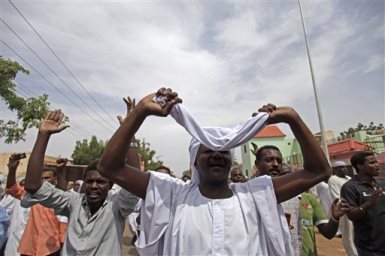Calls for Sudan fact-finding mission into deaths, detention of protesters
November 1, 2013 (KHARTOUM) – Rights groups have called on the African Commission on Human and Peoples’ Rights (ACHPR) to order a fact-finding mission to investigate the deaths and detention of hundreds of protesters during recent demonstrations in Sudan.

At least 170 protesters have died, 15 of them children, and more than 800 others have been detained.
“The African Commission for Human and People’s Rights has so far been silent about the crackdown on protesters in Sudan,” said Osman Hummaida, executive director of the African Centre for Justice and Peace Studies (ACJPS), said in a statement on Friday.
“Africa’s most important human rights institution should condemn the excessive use of force and investigate all reported human rights violations”, he added.
Protests erupted on September 23 in Sudan’s major towns, following an announcement by the government the previous day that it was lifting subsidies on fuel and other basic commodities, leading to calls for regime change.
Many of the protests turned violent as protesters vandalised and set fire to gas stations and police stations, with some also throwing stones at police and security forces.
The Sudanese government responded by firing live ammunition and teargas into demonstrations, killing and injuring dozens of people, including children.
Most of those killed and injured were shot in the head and upper body with live ammunition, witnesses told human rights organisations.
Two bodies identified in a Khartoum morgue had been shot in the back, suggesting that they had been fired on while running away.
More than 800 people have also been detained, according to Sudanese human rights organisations.
While some were released within a few hours or days after their arrest, scores of students, activists, and political opposition party members remain in detention – many without access to lawyers or their families, putting them at risk of ill-treatment, the groups say.
“People have been shot, injured, and detained during protests in Sudan,” said Daniel Bekele, Africa director at Human Rights Watch. “The premier human rights institution of the African continent shouldn’t stand by and watch as the rights of the Sudanese people are violated.”
MEDIA SHUTDOWN
Sudanese authorities have cracked down hard on national and international media outlets over the past month, ordering some to shut down.
Journalists were warned not to write about certain incidents, while strict publication controls were also imposed on newspapers during the protests.
On 25 September, Sudan’s National Intelligence and Security Services (NISS) summoned the medical director of Omdurman Hospital after he spoke on BBC Arabic about the numbers of casualties admitted at the hospital.
The chairman of the Sudanese Doctors’ Union, Dr Ahmed Abdalla Al-Shiekh, was also detained for a number of hours on 5 October after making data from his organisation public that showed at least 210 people had been killed in the protests.
In the letter, rights groups accuse the Sudanese government of violating its obligations under the African charter on human and peoples’ rights which provides guarantees of liberty, freedom of expression, information, association and assembly.
“Instead of reining in the security forces responsible for the excessive use of force, the Sudanese government has put pressure on those seeking to shine a light on its abuses,” said Dismas Nkunda, chair of the Sudan Consortium.
According to the letter, under the African charter, the ACHPR has the authority to conduct “any appropriate method of investigation” into human rights practices and to give its views and recommendations to governments, as well as to co-operate with other African and international institutions concerned with the promotion and protection of human rights.
In June, the ACHPR carried out a fact-finding mission in Mali, in response to a request from the African Union (AU) executive council to investigate the human rights situation in northern Mali and provide concrete recommendations on measures to be taken.
In this context, rights groups say, the ACHPR should launch an investigation into the killings and other abuses allegedly committed during the recent protests.
“Over the past 20 years, the ACHPR has issued several resolutions demonstrating commitment to peace and security, justice and accountability, and respect for fundamental human rights in Sudan and Africa as a whole,” said Hassan Sheikh Shire, executive director of the East and Horn of Africa Human Rights Defenders Project. “The situation in Sudan following the protests demands its attention.”
(ST)
